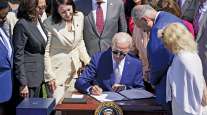Senior Reporter
Infrastructure Stakeholders Renew Calls for Funding

[Stay on top of transportation news: Get TTNews in your inbox.]
WASHINGTON — Approving legislation that promotes funding for safety programs and supply chain connectivity is atop the priority list for infrastructure stakeholders and groups representing the nation’s mobility system.
During an advocacy push for greater investments in large-scale infrastructure projects, stakeholders sought to inform Congress’ upcoming efforts specific to comprehensive transportation legislation. Expected in the measure is a long-term national funding framework for highway operations.
Policymakers intend to stitch together a multiyear highway bill as early as next year to update aspects of 2021’s Infrastructure Investment and Jobs Act. Most transportation funding proponents view the $1.2 trillion bipartisan infrastructure law as a starting point for generational investments.
Suzanne Clark, president and CEO of the U.S. Chamber of Commerce, hosted an advocacy forum May 14 at the group’s headquarters.
NOW LIVE: Follow along with us here for our United for Infrastructure event, where we’ll discuss the challenges & opportunities ahead for our nation’s energy, water, and transportation infrastructure.
We’ve got a great lineup of speakers from @USDOL, @CommerceGov, @USDOT, and… pic.twitter.com/JBxUHTj9gq — U.S. Chamber (@USChamber) May 14, 2024
“It may seem hard to believe, but funding for the bipartisan infrastructure law is nearing its expiration,” she said. “And as the next Congress debates its reauthorization, the best way to build support for this legislation is to be able to point to its impact. That means making it easier to invest, permit and build with speed and efficiency.”
“And it means creating more policy certainty around a host of priorities that impact our nation’s ability to drive growth, innovation and prosperity we’re capable of,” Clark added.

Subramaniam
FedEx CEO Raj Subramaniam, a member of the Business Roundtable’s board of directors, emphasized funding. “Government and industry must work together to find a sustainable funding solution, especially for our highway system and ports,” he told the audience at the chamber. “There needs to be reliable funding to make sure the infrastructure we rely on every day is robust, resilient and safe.”
The American Society of Civil Engineers, a consistent chronicler of the country’s connectivity conditions, highlighted high-risk infrastructure elements. In “Bridging the Gap,” the group outlined a strategy for ameliorating big-ticket projects.
“Recent federal investments have slowed the growth of our national infrastructure deficit; however, the gap has grown too large to single-handedly eliminate with any one source,” the report said. “Feasible, forward-looking policies paired with collaboration across all levels of government and the private sector will be necessary to further support the nation’s vital infrastructure systems and ensure they can provide service for families and businesses now and well into the future.”
2024 Bridging the Gap Infographic
“We failed to prioritize America’s infrastructure systems for decades, and those costs were passed down to businesses and consumers alike,” ASCE President Marsia Geldert-Murphey said. “Federal action has made substantial progress stopping the growth of our needs, but this is just the beginning. We need continued action at the federal level and collaboration from state and local governments and the private sector if we are going to succeed in transforming our aging infrastructure network to be more sustainable, resilient and best suit the future needs of American households and businesses.”
The Business Roundtable, the U.S. Chamber of Commerce and the ASCE are members of the coalition that advocated for additional federal funding during a forum known as “Infrastructure Week.” In 2021, ASCE issued the country’s infrastructure conditions an overall grade of “C-.” The next national ASCE report card will be unveiled in 2025.
Want more news? Listen to today's daily briefing above or go here for more info
Over the years, freight firms, trade unions, transit operators, state highway officials and business groups have collaborated to call on Congress to increase funding accounts for surface transportation programs. Capitol Hill’s transportation leaders acknowledge benefits associated with robust funding for transformative projects, emerging technologies and legacy maintenance.
FedEx ranks No. 2 on the Transport Topics Top 100 list of the largest for-hire carriers in North America.




